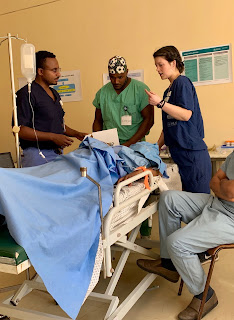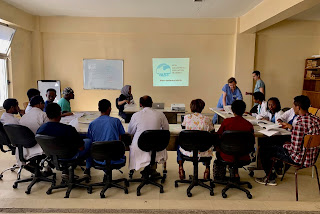Being a geographically small country, Rwanda is linguistically (and culturally) very homogeneous. Day to day most Rwandans speak Kinyarwanda, but due to Rwanda’s French colonial past, most Rwandans grew up also speaking French. Elementary school instruction for most of the country’s independent history was in French. However, in 2009 Rwanda intentionally became a member of the commonwealth and the official academic language became English in schools and colleges. This means that most Rwandans are fluent in Kinyarwanda, and at a somewhat lesser extend English and French.
That being said, many of the difficulties in communication are most complicated than simple linguistic misunderstanding. Let me give you a few examples.
While staying at the Gisakura guest house, we decided to plan the rest of the weekend and upcoming week. I turned on my computer and noticed a Gisakura wifi network. I walked to the desk to ask for the password.
Somewhat timidly I ask, “Excuse me, can you tell me the wifi password?”
The desk clerk replies, “I don’t think the wifi is working very well right now…” looking down at the unplugged wifi router sitting on her desk.
I, not realizing this – in retrospect very obvious non-verbal que – persist. “Well, I see the wifi network on my computer. Can you give me the password to try?”
The clerk again looks at the very obviously unplugged router with a very long pause and a slightly confused look on her face… then reaches for a piece of paper and writes down the password – I imagine deciding that it is just easier to avoid conflict by quietly leaving with the router for the night rather than to argue with this somewhat slow muzungu. By the time I realized that the password supplied was not going to solve the problem, I also decide that just using a cellular hotspot was easier than arguing about the wifi.
The following morning, we enter the Nyungwe park office to be greeted by a friendly park ranger. “Good morning. You are welcome!” he says gesturing to a single chair. I look at the chair and the other three people with me and decide to stand. We all shake hands and exchange pleasantries. Now with all four of us standing near the desk he more emphatically says, “Please, have a seat” again gesturing to the single chair. I decide he really wants at least one of us to sit down so I sit. Proudly he explains “We have many activities in the park: monkey tracking, hikes, nature walks, the waterfall hike, the canopy trail.” Given that we came solidly unprepared and really open to any outdoor park related activity, we attempt to clarify are options.
Chris offers “I hear there are some packages for the trails. Is that true?”
“Yes, sir. You can enjoy many trails with the package. There is a package for short trails and a package for long trails.” A long pause clears the fresh mountain air.
Chris tries “which trails are included in the package.”
The ranger helpful says “the waterfall trail leaves from here at 9am.”
“So, the waterfall hike is included?”
“Sorry, no, sir. The waterfall hike is an additional fee.”
“Oh” Long pause while recalculating… “So, can we do the waterfall hike in the morning and then go on some other hikes in the afternoon?”
“Sorry, sorry. As you can see (gesturing to his watch reading 9am on the dot) you have missed the waterfall hike today”
Being that we had no firm plan, we were undaunted at this point. “Ok, that’s fine.”
“Thank you, sir.” Smiling
“Can we go monkey tracking?”
“Very good. We have 13 different species of monkeys here in the park!”
I break in at this point. “Great! How many Colobus monkeys are there?”
The guard looks up and appears to be counting in his head, responding after some time “37.”
“Ok, when can we see the colobus monkeys?”
“Tracking for colobus leaves 8, 10, (thoughtful pause) 1 and 3.”
“Great. Can we go at 10?”
“Yes, sir. May I please have your passports.”
We hand them over and begin to chat while he carefully writes down our information. Then we he is almost done registering us, he says “The ranger tells me the colobus monkeys in the trees now. They may be somehow difficult to see now. Maybe it’s better not to go now”
Now admitted becoming disappointed and somewhat comedically frustrated, “Ok, fine. Can we go on a nature hike?”
“No problem, sir. They leave from the Uwinka office. You can register for them there.”
“They can’t use the information you have here”
“No sir”
Now trying forcefully to remain upbeat, “Ok. Thank you for your help. Do they accept visa cards at the Uwinka office?”
“Yes, sir. Only visa.”
Upon arriving at the Uwinka office (13 windy mountain road kilometers away), the ranger there informs us that they only take cash.
This kind of miscommunication and misunderstanding is endemic in global health work either in or outside of the operating room. It plagues our ability to be effective and the fault does not clearly sit with one person or group of people. It can be at times comical or mildly frustrating, but at worst it can lead to conflict, destruction of long fostered relationships and even medical error resulting in harm. The most concerning aspect is that Canadian and (even more so) Rwandan culture tends toward being polite, overlooking perceived minor missteps. This means that miscommunication can go unnoticed until too late. The answer is likely that miscommunication decreases gradually as we understand each other’s culture, the words we use, our verbal ticks, and we strength our relationships between people. We can improve things but miscommunication will remain an ever present reality of working cross culturally.
All photos by Jon:
 |
| Colobus monkey |
 |
| leaping monkey |
 |
| tea and hills in Nyungwe |
 |
| three amigos in the tea |
 |
| colourful bird |
 |
| mountain monkey |
 |
| tea fields |
 |
| Nyungwe |
 |
| tea factory |

























